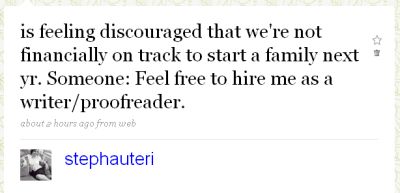
While I use my Twitter account primarily to promote my work, share relevant links, and network with other freelancers, the mundane, the personal, and the desperate often sneak in.
But perhaps that’s a good thing.
From Bunny Slippers to Business Plans

While I use my Twitter account primarily to promote my work, share relevant links, and network with other freelancers, the mundane, the personal, and the desperate often sneak in.
But perhaps that’s a good thing.

Despite all my preparations, when I finally went full-time freelance, I was clueless when it came to finding new projects. As I had always done before, I scoured the job ads, dutifully sent out cover letters and resumes, found a part-time freelance gig that gave me the feeling of stability and, otherwise, waited for the work to come to me.
And for at least a year, it worked. I eventually ended up with two regular, moneymaking gigs, and additional projects continued to come my way via friends and former colleagues. Within only six months, I had matched my previous corporate salary.
Then the publication I was copy editing for folded and, about six months later, the web magazine I was writing for decided to switch things up, leaving me with a lot less income. And it occurred to me: I had been coasting!
I know I’m not the only one. Other office workers looking to go freelance are often surprised to find out that job-finding tactics are wildly different when you’re in business for yourself.
After the jump, some passive and aggressive ways to find work, and why it’s essential that you cultivate a mixture of both:

I’m a bit obsessed with the Twittersphere. I’m logged on 24/7 and use the site to promote my work, seek out sources, and network with other freelance writers. Plus, it helps me to maintain my sanity when I’m desperate for some small bit of human contact.
Why not use the site as a virtual business card as well?

Today marks for first day of ProBlogger’s 31 Days to Build a Better Blog, which I joined in on because, well, frankly, I’ve been losing focus with Freelancedom lately.
I mean, my posts have been coming more sporadically and, when I do post, I worry that my content is too writer-centric (are there any non-writers reading this blog?).
Which is why I was thrilled that the first task of the month was to develop an elevator pitch for your blog.

I can’t believe I haven’t posted about Twitter before. After all, I’ve been using it to promote my writing and connect with other freelancers for quite some time now, and even did a guest post over at TwiTip on taking your Twitter networking from online to in-the-flesh.
I think it warrants a mention here at Freelancedom, no?
After the jump, 4 ways to use Twitter as a means of building your personal business:

[Photo via]
We fill our resume with words and phrases such as “detail-oriented” and “innovative,” and list job responsibilities instead of quantifiable acomplishments and successes.
And then we send it off to an HR associate who has probably received…well, just about as many resumes as the woman in the photo above.
In a time when competition is getting fiercer, and all resumes look the same, isn’t it time to start rethinking the way you’re presenting yourself?
Cover letters are the place to start. But they won’t help you any if you continue to make the same mistakes. It’s time to start thinking about features vs. benefits.

Between a last-second edit test, a quick trip to PA, and a full day holding poses for a portrait artist, I. am. wiped. So I hope you’ll forgive me for relying on an easy-as-pie Coffee Break post so early in the week.
This one was actually inspired by a conversation taking place over at the mediabistro bulletin boards, on how different pitching tactics have different success rates.

2008 started out strong. I was finishing up an internship at Material Media (of Nerve and Babble fame), and gearing up to take on more hours at the New York Sun. And then I was chosen to be a blogger for Modern Materialist.
Soon after that, I realized that — only six months after leaving my full-time job in academic book publishing — I had matched my previous salary. I reveled in my blogging gig, was content with my regular copy editing gig at the Sun, and was also doing freelance work for several book publishers. I even got the occasional writing clip. I began planning for more.
I continued my self-education, and began blogging about blogging for Smarter Than Your Average Blog (a gig I eventually left behind). I also began considering a path toward career coaching, and career-related writing. I did extensive research and conducted informational interviews. I was all set to enter a certification program when everything went to hell.
The Sun folded, and the rest of the industry (not to mention the economy at large) followed suit. I no longer had the income necessary to sign up for a coaching certification program. I floundered trying to figure out whether or not I was cut out for freelancing, and what I even had to offer. I struggled unsuccessfully to find a part-time job in the publishing field.
I’ve since gotten a number of new clips (see here, here, here, and here), but I have yet to take advantage of the momentum, and suffer from mood swings and lack of motivation. Can I turn things around in 2009? Perhaps. If I’m willing to learn from my mistakes.
After the jump, 10 things I did wrong in 2008:
I’m a bit behind in updating my online portfolio. Because my professional site is not dynamic, I need to harass my husband every time I want a link to a new clip put up (conveniently, I’m married to my web designer). We plan on making the site dynamic at some point but, for the moment, I’m wondering if I should take advantage of some of the freelancer-friendly, portfolio-specific sites out there.
After the jump, a brief look at 7 different portfolio sites that you should check out.
It being Thursday and all, I would normally post a book review.
Last night, however, I found out that my main source of income may be folding, so I figured this was the perfect time to touch upon the ways in which you can keep the unexpected vagaries and pitfalls of freelancing from plunging you into financial ruin. The main thing to remember? Don’t put all your eggs in one basket:
Copyright © 2025 Freelancedom